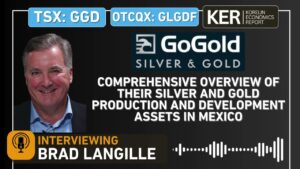VANCOUVER, BRITISH COLUMBIA — (Marketwired) — 11/05/13 — Timmins Gold Corp. (TSX:TMM)(NYSE MKT:TGD) (“Timmins” or “the Company”) is pleased to announce the results of the recently completed NI 43-101 Technical Report for the San Francisco Gold Mine in Sonora, Mexico (the “SF Mine”) prepared by Micon International Limited of Toronto (“Micon”). The report was prepared to update the previous technical report for the SF Mine dated November 1, 2011, and to provide a base case scenario for production at the SF Mine as a result of a material increase in the estimated Mineral Reserves from the 2012-2013 drill program (43% increase in Reserve gold ounces excluding depletion). For details of the updated Reserve and Resource estimates please refer to our new release dated November 5, 2013 disseminated earlier today. All amounts are presented in United States dollars and the economic evaluation is presented on a pre-tax basis.
Highlights:
— Pre-tax undiscounted cash flows of $489 million at a constant gold price
of $1,350/oz— Pre-tax Net Present Value (NPV) at a 5% discount rate of $381 million at
a constant gold price of $1,350/oz— Estimated Mine Life based on Reserves of 9.5 years (2H 2013-2022)
— Estimated Life-Of-Mine (“LOM”) production of 1.16 Moz of gold based on
Reserves— Estimated LOM average annual production of 122,000 ozs of gold from
2014-2022— Estimated LOM cash costs of $823/oz (including by-products)
— Estimated LOM average site-level all-in sustaining costs of $843/oz
(including by-products)— Estimated LOM site-level all-in costs (cash costs + all capex) of
$927/oz (including by-products)
“We are extremely encouraged by the Reserve and Resource growth from our drill program,” states Bruce Bragagnolo, CEO of the Company. “The updated Reserve underpins a 9.5-year mine life at approximately 122,000 ozs of gold per year. Considering the size of our Measured and Indicated Resources (279 kozs excluding Reserves) and our Inferred ounces (1.78 Mozs), we expect that with future drilling the mine life can be further increased. Our updated mine plan continues to highlight the free cash flow potential and low all-in cost nature of the San Francisco Mine.”
OPERATING PLAN
For 2014 and 2015, all production is planned to be sourced from the San Francisco (“SF”) deposit. The average daily throughput is expected to be approximately 24k tonnes per day (“tpd”) for 2014 and 2015. Throughputs of 24k tpd have been achieved as of October 2013, therefore we plan to operate at steady-state for the next two years. Minimal development capital expenditures are planned for the next two years during which period we plan to focus on cash accumulation and strengthening the balance sheet. Starting in 2014, lower-grade ore will no longer be stockpiled and average stacked grades will approximate the Reserve grade.
Production from the La Chicharra (“LC”) deposit is planned to begin in early 2016. The average daily throughput from 2016 onwards is expected to be 30-32k tpd (24k tpd from SF and 6-8k tpd from LC). The installation of an 8k tpd crushing unit and new leach pad at LC is scheduled to begin in late 2015 and pre-stripping at LC is scheduled to begin in early 2016.
CAPITAL PLAN
Planned capital expenditures over the mine life, including sustaining capital and capitalized deferred strip, is outlined in Table 1 below. The plan for development capital expenditures (i.e. excluding sustaining capital and deferred strip) is summarized below:
— 2014: $3M for LC crushing equipment; $2M for current primary crusher
relocation
— 2015: $6M for new leach pad; $3M LC crushing install
— 2016: $12M for LC pre-stripping
— 2017: $2M leach pad expansion
— 2018-2022: $6M leach pad expansion (2019), $3M leach pad expansion
(2021)
ECONOMIC EVALUATION
Revenue projections are based on a constant gold price of $1,350/oz in real terms. The constant silver price assumed is $20/oz. The mine plan from 2014-22 is split into three phases and is summarized in Table 1. At a gold price of $1,350/oz, the undiscounted pre-tax cash flow of the mine plan is $489M and the pre-tax 5% discounted NPV is $381M. Table 2 presents the sensitivity of the NPV to various gold prices. The recently proposed Mexican mining taxes/royalties have not been incorporated into the economic evaluation presented here, as the related legislation had not officially been enacted as of the date of this evaluation.
Table 1 – San Franciso Gold Mine: Mine Plan Summary (2014-22)
—————————————————————————-
Phase 1 Phase 2 Phase 3
(2014-15) (2016-20) (2021-22)
—————————————————————————-
Approx. Avg. daily
throughput 24k tpd 30k tpd 30k tpd
—————————————————————————-
Ore Source % SF(30%)/LC(30%)/stock
SF(100%) SF(75%)/LC(25%) pile(40%)
—————————————————————————-
Avg. Gold Grade 0.58 gpt, 0.26 gpt
0.59 gpt 0.51 gpt (stockpile)
—————————————————————————-
Avg. Operating Strip
Ratio 2.4 2.7 1.4
—————————————————————————-
Avg. Total Strip Ratio
(Op. + Deferred) 2.5 3.2 1.4
—————————————————————————-
Avg. Gold production 130 koz (2021), 53
121 kozpa 135 kozpa koz (2022)
—————————————————————————-
Avg. Cash Costs per oz
(by-product) $758 $895 $663
—————————————————————————-
Avg. Sustaining Capex $2M/yr $3M/yr $2M/yr
—————————————————————————-
Avg. AISC per oz, site-
level (by-product) $775 $918 $674
—————————————————————————-
Avg. Deferred Strip Capex $2M/yr $9M/yr nil
—————————————————————————-
Avg. Development Capex $7M/yr $4M/yr $2M/yr
—————————————————————————-
Avg. AIC per oz, site-
level (by-product) $846 $1,016 $686
—————————————————————————-
Gold Price per oz Assumed $1,350 $1,350 $1,350
—————————————————————————-
Avg. Annual Net Cashflow
(excl. taxes,
royalties) $61M/yr $44M/yr $82M, $37M
—————————————————————————-
Notes: Assumptions – (1) Avg. total costs of $10.75/t for SF and LC; (2) Avg. life-of-mine heap leach recovery of 68% for SF ore, 70% for LC.
To view Table 2 – San Francisco Gold Mine: NPV(5%) Sensitivity to Gold Price, please visit the following link: http://media3.marketwire.com/docs/tmm115-T2.pdf.
The National Instrument 43-101 (“NI 43-101”) Technical Report describing the details of the updated Reserve and Resource estimates and associated mine plan will be filed on SEDAR (www.sedar.com) within 45 days from the date of this press release.
Technical Information and Qualified Person Notes
This press release was reviewed by Lawrence A. Dick, Ph.D., P.Geo, of Vancouver, British Columbia, who is recognized as a Qualified Person (“QP”) under the guidelines of National Instrument 43-101 (“NI 43-101”). The press release was prepared by Miguel Soto, P. Geo. Eng., a Director and Vice-President of the Company, and Taj Singh, M.Eng, P.Eng, a Vice-President of the Company, who is recognized as a QP under NI 43-101. Pursuant to NI 43-101, Mr. William Lewis, B.Sc, P.Geo, Mr. Mani Verma, M.Eng, P.Eng, Ing. Alan J. San Martin, MAusIMM(CP), from Micon are the independent QPs responsible for the Mineral Reserve and Mineral Resource Estimate. Mr. Richard M. Gowans of Micon is the independent QP responsible for the metallurgy section. Each of Mr. Lewis, Mr. Verma, Mr. San Martin, Mr. Gowans, Mr. Singh and Mr. Soto have read and approved the contents of this news release.
Neither the TSX nor its Regulation Services Provider (as that term is defined in the policies of the TSX) nor the New York Stock Exchange MKT accepts responsibility for the adequacy or accuracy of this news release.
Cautionary Note to United States Investors
The Company is subject to the reporting requirements of the applicable Canadian securities laws, and as a result it reports its mineral reserves and resources according to Canadian standards. Canadian reporting requirements for disclosure of mineral properties are governed by NI 43-101. The definitions of NI 43-101 are adopted from those given by the Canadian Institute of Mining, Metallurgy and Petroleum. U.S. reporting requirements are governed by Industry Guide 7 (“Guide 7”) of the Securities and Exchange Commission (the “Commission”). These reporting standards have similar goals in terms of conveying an appropriate level of confidence in the disclosures being reported, but embody different approaches and definitions.
For example, under Industry Guide 7, mineralization may not be classified as a “reserve” unless the determination has been made that the mineralization could be economically and legally produced or extracted at the time the reserve determination is made. In particular, the Company reports “resources” in accordance with NI 43-101.
While the terms “Mineral Resource”, “Measured Mineral Resource”, “Indicated Mineral Resource” and “Inferred Mineral Resource” are recognized and required by Canadian regulations, they are not defined terms under standards of the Commission and generally, U.S. companies are not permitted to report resources in documents filed with the Commission. As such, certain information contained in this MD&A concerning descriptions of mineralization and resources under Canadian standards is not comparable to similar information made public by United States companies subject to the reporting and disclosure requirements of the Commission.
In addition, an Inferred Mineral Resource has a great amount of uncertainty as to its existence and as to its economic and legal feasibility, and it cannot be assumed that all or any part of an Inferred Mineral Resource will ever be upgraded to a higher category. Under Canadian rules, estimates of Inferred Mineral Resources may not form the basis of feasibility or other economic studies.
It cannot be assumed that all or any part of Measured or Indicated Resources will ever be converted into Mineral Reserves, and it cannot be assumed that all or any part of an Inferred Mineral Resource exists, or is economically or legally mineable. In addition, the definitions of “Proven Mineral Reserves” and “Probable Mineral Reserves” under CIM standards differ in certain respects from the standards of the Commission.
Cautionary Note Regarding Forward-Looking Statements
Certain statements contained herein may constitute forward-looking statements and are made pursuant to the “safe harbor” provisions of the United States Private Securities Litigation Reform Act of 1995 and Canadian securities laws. Forward-looking statements are statements which relate to future events. Such statements include estimates, forecasts and statements as to management’s expectations with respect to, among other things, business and financial prospects, financial multiples and accretion estimates, future trends, plans, strategies, objectives and expectations, including with respect to production, exploration drilling, reserves and resources, exploitation activities and events or future operations. Information inferred from the interpretation of drilling results and information concerning mineral resource estimates may also be deemed to be forward-looking statements, as it constitutes a prediction of what might be found to be present when, and if, a project is actually developed.
In some cases, you can identify forward-looking statements by terminology such as “may”, “should”, “expects”, “plans, “anticipates”, believes”, “estimates”, “predicts”, “potential”, or “continue” or the negative of these terms or other comparable terminology. These statements are only predictions and involve known and unknown risks, uncertainties and other factors that may cause our or our industry’s actual results, level of activity, performance or achievements to be materially different from any future results, levels of activity, performance, or achievements expressed or implied by these forward-looking statements.
While these forward-looking statements, and any assumptions upon which they are based, are made in good faith and reflect our current judgment regarding the direction of our business, actual results will almost always vary, sometimes materially, from any estimates, predictions, projections, assumptions or other future performance suggestions herein. Except as required by applicable law, Timmins Gold does not intend to update any forward-looking statements to conform these statements to actual results.
Contacts:
Timmins Gold Corp.
Bruce Bragagnolo
CEO and Director
604-638-8980
bruce@timminsgold.com
www.timminsgold.com

















